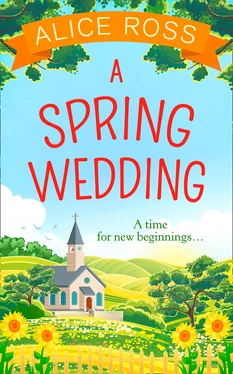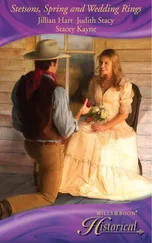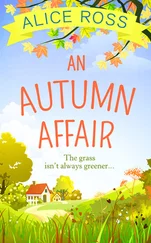‘Left at the junction and you’re there,’ she replied, tossing him a cursory smile.
‘Great. Thanks.’
She didn’t look at him again, but held up her hand in reply, before stuffing the earphone back in.
Well, thank goodness for that, mused Jake. He was on the right road – at long last. He glanced in his rear-view mirror as he drove away. The girl was still running – with those legs. He swiped a bead of sweat from his brow and suddenly felt quite peculiar.
An hour later, eventually arriving at his destination via the village pub where he’d tucked into a hearty portion of fish and chips followed by apple pie and custard, Jake almost had to pinch himself. Fate had definitely shone on him the day he bumped into Jasper Pinkington-Smythe at the London airport a few weeks ago. Jake was flying home to Scotland after a meeting with his literary agent. Jasper had been en route to his family’s villa in Majorca. He asked Jake what he was up to and Jake muttered something about having a stab at writing a book. The predictable ‘what about?’ followed. Never comfortable talking about his writing, Jake mumbled something vague about a murder-mystery set in a medieval castle.
‘If you’re looking for somewhere atmospheric to write it, you could always use Buttersley Manor - our family pile in Yorkshire,’ Jasper chuckled. ‘Not quite a castle, but it’s medieval and even has the obligatory ghost apparently.’
‘That’s very kind,’ Jake replied. ‘But I couldn’t.’ He hadn’t seen Jasper for years. It didn’t seem right. Jasper, on the other hand, didn’t seem remotely bothered by that fact.
‘Why not? The place will be empty for the next six weeks. Seriously. You’d be doing us a favour. Always better to have someone in it. Security and all that.’
‘It’s really good of you to offer, but I couldn’t,’ Jake insisted.
And the subject had been dropped. Or so Jake had thought. Emptying his rucksack at home later that evening, he’d discovered a large brass key wrapped in a brown paper bag. On the bag were a couple of blobs of strawberry jam and scribbled directions to Buttersley Manor. Jasper had obviously hidden it in the bag when Jake wasn’t looking.
Jake’s initial reaction was to return the key. But, bitten by curiosity, he couldn’t resist Googling the manor. The images had blown him away. Seeds of inspiration had sprouted just looking at them. But he couldn’t possibly take Jasper up on his offer. It didn’t seem right. Then again, hadn’t he said the place would be empty for the next six weeks? Hadn’t he insisted Jake would be doing them a favour? And, if the man had been resourceful enough to slip Jake the key, didn’t that provide some indication of how much he wanted him to go? Flicking through the pictures Jake decided he did want to go. Very much. Six glorious uninterrupted weeks in a majestic setting, where he could write to his heart’s content. What more could an author ask for?
Now, inside the manor, wandering from wonderful room to wonderful room, breathing in the heady mix of wood polish, dust, and centuries of Pinkington-Smythe family history, Jake couldn’t believe his luck. The place was a writer’s heaven, a creative paradise oozing atmosphere from every knot of wood, stone fireplace and panelled wall. Excitement bubbled in his stomach. He would stock up on provisions, find the perfect writing spot – a small drawing room on the ground floor overlooking a lawn looked promising – and he would absorb himself in the writing of his next book. Lose himself, once again, in another imaginary world – one infinitely preferable to the real world.
Of course, Jake had not always harboured such reclusive tendencies. A short time ago such an existence would have seemed complete anathema to him. A life without the buzz and banter of the office – without the adrenalin rush of split-second, multi-million pound decisions, and without the constant need to keep one step ahead, to keep one’s pulse on world affairs and second-guess the markets – would not have seemed like a life worth living. But that had been five years ago. Before Nina’s death. Before her beautiful young life had been abruptly ended on a country road by a cocky seventeen year old.
At first people blamed shock for Jake’s change in behaviour. Time is a great healer, they said. But it wasn’t. Jake could still remember opening the door to the chubby policeman as if it had been yesterday. The man’s hands had been covered in flecks of white paint. For some unfathomable reason it was those flecks of paint Jake had focused on as the devastating news had drifted from the constable’s mouth. The words had bounced off him like hailstones off a tin roof. He’d heard them but couldn’t take them in. It wasn’t until Nina’s funeral ten days later, as he stood in the graveyard watching the mahogany box which contained her beautiful body – the body he had known so intimately – being lowered into the hole in the ground, that the implications of what had happened struck him. Nina was dead. And so, too, was the child she’d been carrying, the child they’d created together, the daughter he would never now hold in his arms. That evening he cried until the tears ran dry. Then he sat up all night and made some life-changing decisions.
‘But you can’t sell the business,’ his second-in-command, Mark, protested the following day. ‘You’ve spent years building it up. Look at all the blood, sweat and tears you’ve put into it. You’re exactly where you wanted to be – the most successful fund manager in Europe.’
‘Well, maybe I don’t want to be there any more,’ Jake countered. ‘Maybe now I want something completely different.’
‘You’re rushing into things. Why don’t you take a few months off? Go travelling or something? Do … I don’t know … whatever you feel like doing.’
‘This is what I feel like doing.’
‘But you’re in shock. It’s only days since Nina … since Nina … ’
‘Died, Mark. Nina is dead,’ Jake cut in, amazed that such a tragic incident, which had ended two lives and touched so many others, could be summed up in three short words.
‘Exactly. Which is why this is not a good time to make any decisions, never mind one so drastic.’
‘It’s what I want to do.’
And so, despite the media furore and industry speculation, Jake organised a management buyout, offloading the business to his employees. He sold his Chelsea apartment and bought a small cottage in Scotland on the banks of Loch Tay - a modest, peaceful house in a secluded spot, nestled amongst the heather. After a few months the invitations to London parties and requests to visit dwindled. Jake had been relieved. London – and his old life - seemed a million miles away, as if it had all belonged to someone else.
Becoming accustomed to his own company, Jake spent weeks exploring the Scottish countryside, days walking from dawn ‘til dusk. Then, as winter drew nearer and the days grew shorter, he looked for something to occupy his time indoors. He decided to write a book.
From a germ of an idea, a dark mystery set in Victorian London sprouted. With only a vague idea of the plot, once Jake began to type, the words flowed and flowed - at an astonishing rate. It took only ten weeks for him to complete the book. Ten weeks in which he completely absorbed himself. He didn’t listen to the radio, he didn’t watch TV, he didn’t read a newspaper, he scarcely set foot outside the house. Then he looked at the four hundred pages filled with neatly typed words and wondered what to do with them. In the absence of any better ideas he emailed them to a literary agent in London using the pen name Martin Sinclair. To his amazement, he received a reply eight weeks later, saying they were very interested and would like to meet him.
Читать дальше












